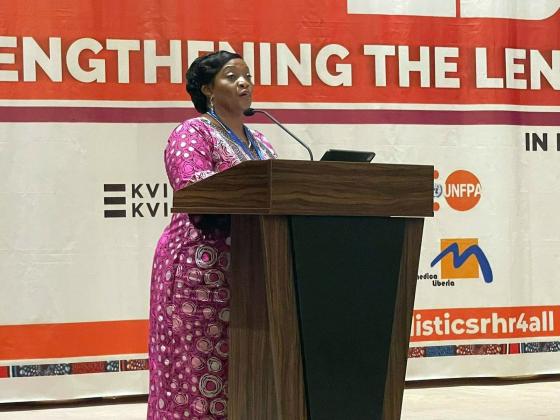Liberia: VP Taylor Calls for More Support to FGM Heritage Centers

Vice President Jewel Howard-Taylor has called on the European Union and the UN to increase funding for the heritage and vocational centers that were built as an alternative for traditional leaders to end the practice of female genital mutilation (FGM).
She said that although the government would provide assistance, partners must take the initiative because they spent millions of dollars to construct these centers.
“I want to make a clarion call that some attention needs to be paid so that those facilities that have been put in place don’t just sit and become empty,” she said.
Putting a three year ban on FGM in Montserrado county, traditional leaders were given these centers in Todee, rural Montserrado, Nimba, Lofa, and Grand Cape mount counties.
Announcing the ban, Chief Zanzan Karwor said, “By the power vested in me, as Chairman of all the traditional chiefs in 15 Counties, FGM is banned in this country” and he called on chiefs and elders to share the message around the country.
According to an email from UN Women, these centers were built to empower traditional practitioners with requisite skills and expertise that could lead to the abandonment of FGM since most of them were engaged in the said practice for economic gains.
Adding that the vocational and heritage centers will provide opportunities for school age young girls to obtain formal elementary education. For out-of-school girls and young women, the center will provide a combination of traditional and non-traditional vocational skills of their choice that are market-driven.
“The center will finally serve as a hub for cultural activities (without FGM) and maintain climate smart agriculture programmes on the surrounding land availed by the Government for its users,” said an email from UN Women."
With funding from the EU, the centers were constructed by UN Women under the framework of the European Union and United Nations Spotlight Initiative as an alternative to end FGM.
According to a UN report, 44 Percent of Liberian girls and women belong to the tribes that still practice Sande Bush schools and it is likely almost all have undergone FGM.
FGM is a practice of cutting the inner and outer labia from some and girls, usually the clitoris. It is done by a traditional leader known as a “zoe”.
Often the zoes use a razor blade for the extremely painful procedure. The practice has been blamed for infection, excessive bleeding, trauma and lifelong health problems in later life including difficulty in childbirth.
Speaking at the first Sexual and Reproductive Health Rights conference in Monrovia, VP Taylor used the occasion to plead with EU and the UN to further provide funding for the centers.
“I want to again use this platform to remind the international community that many promises have been made that as we shut down these systems a system will be put in place that women who improve their lives at these centers will get skills and be able to be productive,” she said.
Held in partnership with the Swedish Association for Sexuality Education(RFSU), the Clinton Health Access Initiative, and the Kvinna till Kvinna with support from the Swedish embassy, the event was hosted by the Amplifying Rights Network(ARN).
ARN, a coalition of ten civil society organizations in the field of sexual reproductive health and rights, comes as they claim growing public support for abortion legalization in Liberia.
“A prosperous Liberian society requires access to comprehensive, quality, gender responsive, and inclusive SRHR so that all Liberian, and in particular women, girls, sexual minorities, persons with disabilities, and persons in vulnerable situation have the tools, information, and services to make choices,” said Naomi Tulay-Solanke, the chairperson of the group.
According to her, the conference served as a unique opportunity for SRHR actors to further advocate for laws and practices based on international standards and guidelines with human rights at its core and strengthen the movement.
The SRHR Conference, which started on May 26, 2023, and ended on May 28, 2023, brought together 400 delegates, including adolescent girls and boys, men and women, persons with disabilities, sexual minorities, and other groups from rural and urban Liberia. The conference was organized by the Amplifying Rights Network (ARN), a coalition of ten (10) civil society organizations from diverse backgrounds.
The three-day conference brought together SRHR actors and rights groups to discuss and build consensus for the critical need for access to comprehensive sexuality education and other age-responsive sexual reproductive health (SRH) practices and influence SRH practices with evidence-based and human rights-based approaches for improved access to reproductive health commodities.
